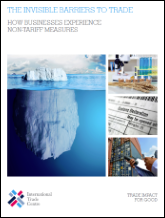Central America is continuing to make headway on the process of consolidating the Central American Customs Union (UAC). On the one hand, the first round of the UAC (in Spanish) took place on August 28 in El Salvador, which has the pro-tempore presidency of the group. At the event, the Regional Trade Facilitation and Competitiveness Strategy was passed, which will be examined by the Council of Ministers for Economic Integration (COMIECO) in October.
Cooperation-related issues of relevance to the region were reviewed, and priority projects were identified in connection with trade facilitation, the implementation of the Strategic Partnership Agreement with the European Union, technical regulations, quality management systems, and taking advantage of opportunities for trade.
Especially noteworthy is the completion of the technical review of all chapters of the Central American Tariff System (SAC) that will be affected by the amendments to be included in the sixth version of the World Customs Organization (WCO) Harmonized System.
During this round progress was also made on the incorporation of Panama into the Central American Economic Integration Subsystem (SIECA): negotiations around the country’s Protocol of Accession to the Central American Treaty on Trade in Services and Investment were concluded. This protocol gave notice that 17 new Central American technical regulations had been incorporated into Panama’s national legislation. Furthermore, the rules of origin for detergents, freezers, refrigerators, and alcohol and alcoholic beverages were harmonized; 21 rules of origin thus remain to be harmonized.
The next round of the UAC will take place in San Salvador in October.
On the other hand, bilateral negotiations for the implementation of the UAC continued to move forward.
The 5th Round of Negotiations for the Guatemala–Honduras Customs Union (in Spanish) took place in Tegucigalpa from September 2–4, where the issues discussed included those relating to tariffs, domestic taxes, customs, migration, and sanitary and phytosanitary measures, among others. Authorities from the two countries reported that the Enabling Protocol for the full implementation of the Customs Union is now awaiting the approval of the two countries’ parliaments.
Also, at a meeting organized by the Inter-American Development Bank (IDB), Costa Rica and Panama (in Spanish) made binational recommendations regarding the design, procedural logic, and flow of the Integrated Control Centers (CCI) at the border crossings at Paso Canoas and Sixaola-Guabito. These CCIs will be financed by the IDB and are part of the Mesoamerica Project.
Related Articles:
- IDB/INTAL. “Progress in Central American Domestic and Foreign Integration Agendas,” in: INTAL Monthly Newsletter No. 169, September 2010.
- IDB/INTAL. “An Active Trade Negotiation Agenda in Central America,” in: INTAL Monthly Newsletter No. 170, October 2010.
- IDB/INTAL. “Trade Negotiations in Central America”, in: INTAL Monthly Newsletter No. 172, December 2010.
- IDB/INTAL. “The Isthmus Makes Steady Progress in Intra-Central American Integration: the 2011 Action Plan,” in: INTAL Monthly Newsletter No. 175, March 2011.
- IDB/INTAL. “Priorities for Central American Integration in the Second Semester of 2011,” in: INTAL Monthly Newsletter No. 180, August 2011.
- IDB/INTAL. “Panama an Observer at the Customs Union Round,” in: INTAL Monthly Newsletter No. 183, November 2011.
- IDB/INTAL. “Positive Results toward Customs Union,” in: INTAL Monthly Newsletter No. 185, January 2012.
- IDB/INTAL. “Central American Regional Integration Highlights of 2013: Panama, Dominican Republic, and the EU Agreement,” in: INTAL Monthly Newsletter No. 208, December 2013.
- IDB/INTAL. “Progress over Central American Customs Union,” in: INTAL Monthly Newsletter No. 211, March 2014.
- IDB/INTAL. “Advances in Central American Economic Integration in 2014,” in: INTAL Monthly Newsletter No. 220, December 2014.
- IDB/INTAL. “Guatemala and Honduras Make Headway on the Central American Customs Union,” in: INTAL Monthly Newsletter No. 228, August 2015.



